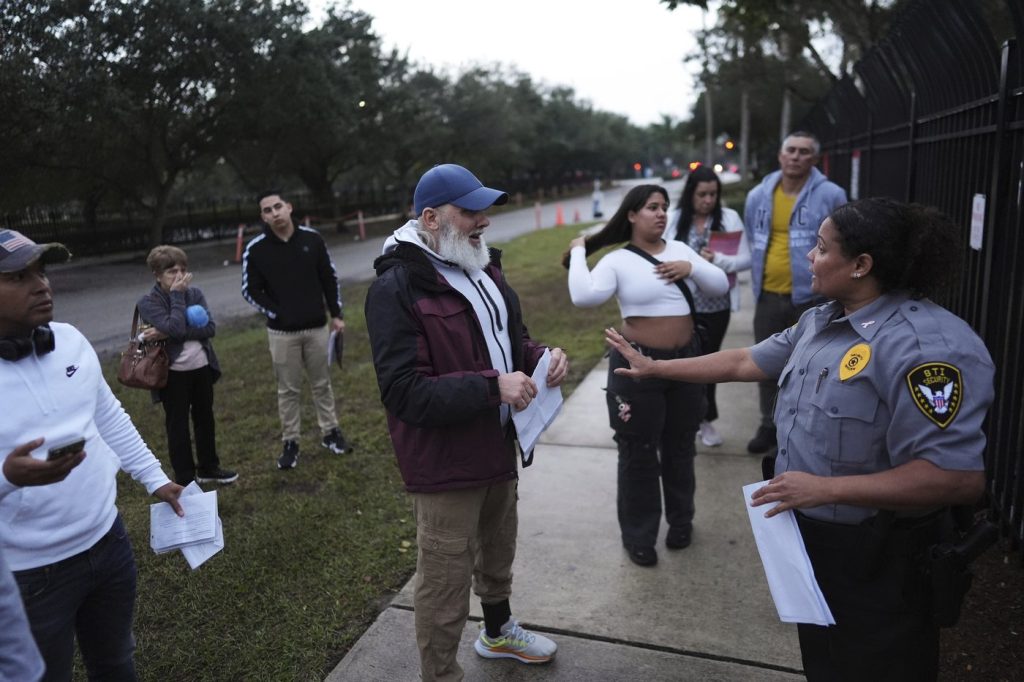TALLAHASSEE, Fla. (AP) – On Tuesday, Florida lawmakers approved a comprehensive immigration bill, allocating $500 million in public funds aimed at reinforcing President Donald Trump's stringent immigration policies. The legislation mandates that all levels of government, along with contractors, must collaborate with federal immigration enforcement "to the fullest extent possible." This move comes in a state where approximately one in five residents is an immigrant.
The bill, known as the Tackling and Reforming Unlawful Migration Policy, or TRUMP Act, passed after more than four hours of debate, mainly along party lines in the Republican-controlled Legislature. Its approval sets the stage for potential conflict between Republican Governor Ron DeSantis and legislative leaders, who have been at odds over whose plans would more effectively implement Trump’s immigration crackdown. DeSantis has characterized the bill as "weak."
Senator Joe Gruters, one of the bill's sponsors and a supporter of Trump, emphasized that the legislation is designed to facilitate coordination between local governments and federal immigration authorities. However, the bill has faced criticism even from within the Republican Party, with one House member and six Senate members voting against it. Notably, the bill did not achieve a veto-proof majority.
Amid rising tensions between DeSantis and the state legislature, Senate President Ben Albritton and House Speaker Daniel Perez revealed new amendments to the bill, which they claimed were developed with assistance from the Trump Administration. These changes included increased penalties for crimes committed by individuals in the country illegally and a provision requiring death sentences for capital offenders. Nevertheless, some of DeSantis’ proposals—such as restrictions on remittances sent abroad by undocumented immigrants—were not included.
As lawmakers move forward, Governor DeSantis faces a pivotal decision regarding a bill he has publicly derided as "toothless" and "watered-down." He could sign the legislation, veto it, or allow it to become law without his signature.
The approved legislation proposes the establishment of a state immigration enforcement office with over 140 employees, supervised by a newly appointed chief immigration officer, who will be the state’s agriculture commissioner. Additionally, it transfers emergency immigration enforcement powers from the governor to this officer. The funding portion allocates $100 million in grants to local law enforcement agencies for necessary training and equipment, along with $375 million to bolster state compliance with federal directives. Furthermore, it sets aside $25 million for $1,000 bonuses for local law enforcement personnel who assist federal authorities.
Democratic lawmakers opposed various provisions of the bill, particularly the requirement for cooperation with federal immigration enforcement. They voiced concerns about the ambiguity surrounding what "the fullest extent possible" might entail for government employees like teachers and social workers. Gruters clarified that the intent was to ensure more collaboration with officials managing jails and detention facilities, although he acknowledged that the scope could shift with changing federal priorities.
Significantly, the bill also seeks to repeal a state law from a decade ago that enabled undocumented students to qualify for in-state tuition at public colleges and universities. This decision affects around 6,500 students who were benefiting from the previous provision, which had been sponsored by the state's current lieutenant governor, a member of the Republican Party.
During debates, Democratic Senator Darryl Rouson recalled the sentiments of the lieutenant governor, who once advocated for the rights of these students, expressing concern over the evolving political landscape that seems to disregard immigrants’ contributions. Another Democratic member, Rep. Jose Alvarez, passionately addressed lawmakers, urging them to reconsider the implications of their actions, emphasizing the core American values of inclusion and compassion.
The appointment of the agriculture commissioner as the chief immigration officer has been a point of contention, with DeSantis arguing that it’s problematic given the agriculture sector’s historical disconnect with immigration enforcement. Speaker Perez, in his closing remarks, seemed to acknowledge the pressure from the governor, urging colleagues to focus on their work rather than engage in personal conflicts.
Florida's actions mirror similar responses from other states led by both parties as they navigate Trump's immigration agenda, resonating with recent legislative efforts in states like Tennessee.










